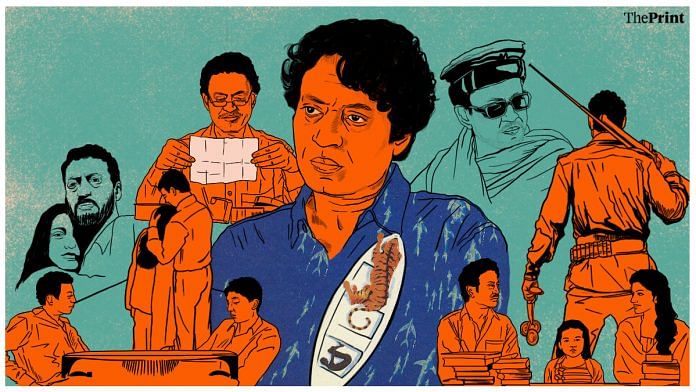Literary giant Shakespeare and late Bollywood actor Irrfan Khan don’t have much in common, except for filmmaker Vishal Bhardwaj, who was “torn into two” after the latter’s death in 2020. After casting the actor in Maqbool — the Indian adaptation of Macbeth — Bhardwaj dug up his love for literature and seasoned it with a distinctly Indian flavour. In Irrfan Khan, biographer Aseem Chhabra writes that Khan was born to play Maqbool.
Did Maqbool change anything?
Not at the box office, where the other Khan was charming audiences with Main Hoon Nas and Veer Zaaras. But for modern cinema, it was a game-changer. It brought two things — a taste for ‘Shakespeariyat’ at home, and the rustic, broody-eyed Irrfan Khan who had made his backdoor-entry as the industry’s underdog. The National School of Drama student had made his mark.
Also read: Irrfan Khan landed the role of Maqbool after Naseeruddin Shah vetoed Kamal Haasan
The oddball in Bombay
Popular culture can be unforgiving. In every era, it sketches a hero, and by some unspoken rule, each struggling ‘hero’ wants to see themselves reflected in it. The grandiose syndrome is hard to miss — you run out of fingertips when counting biographies and autobiographies of actors. Not Irrfan, who said, “It’s boring to brag about yourself,” and thought his life was too dull to be published, for it was one that resonated with millions of others who entered Bollywood’s sprawling canvas with a carte blanche.
In the 1990s and the 2000s, when he was still testing waters, Mumbai’s film industry was the world of the alpha male, and not a dark-skinned, lanky, Jaipur boy whose parents owned a tyre shop and wanted him to settle close to home with a mediocre job. It was also a world where perhaps one quality was more important than acting itself — the ability to be patient. Luckily, Irrfan had both.
Like thousands of other struggling actors, he took his course in the great churning factory that’s Mumbai — Irrfan’s debut film Salaam Bombay! was chopped at the editing table; he was seen for a while in TV shows such as Star Bestsellers and The Great Maratha on DD National, and audiences enjoyed the goofy Irrfan in the TV show Banegi Apni Baat in the ‘90s.
After 14 years of patience, Irrfan was cast in the British film The Warrior.
Toeing on the trail of his seniors from the National School of Drama — Naseeruddin Shah, Om Puri, Pankaj Kapur — Irrfan chose to stick out like a sore thumb. He knew the industry would not be so generous to offer him leading roles, and that he would always be on the margins. But Irrfan’s weighty eyes were much more than a stage prop — it held a mighty love for passionate acting.
Also read: Irrfan’s 8 finest performances and what made them so special
The toil towards ‘Indianness’ and success
Nothing established Irrfan Khan’s image more than Mira Nair’s The Namesake (2006). For many, Irrfan playing Ashoke Ganguli alongside Tabu has become his defining role. Released two years after Maqbool, the film captured the anxiety of Indian immigrants and middle-class dreams. Irrfan was doing what he thought was essential for Indian actors to succeed abroad — make Hollywood “taste blood.”
Irrfan could easily be Ashoke, Maqbool, Monty (Life in a…Metro), Rajeev (Lunchbox), Raaj (Hindi Medium), Roodaar (Haider) and Rana (Piku).
Indians loved the seemingly-inconspicuous actor who peppered films with his dry humour. His nonchalance won him the greatness for which others in the industry toiled. It’s because we also understood him—neither did he belong to the polished world, nor did he aspire to.
In Paan Singh Tomar (2012), Irrfan’s character offers his journalist guest a dessert of gulab jamun and vanilla ice-cream, and that’s a cue of the actor’s place on the industry banquet — a curious mix of ‘desiness’ with a dollop of humble foreignness.
It’s that ease that let the actor feature in HBO’s In Treatment, playing a Bengali expatriate on a therapy couch, battling loneliness in America. For playwright Adam Rapp, Irrfan was “an actor with great depth.”
Likewise, Slumdog Millionaire (2008) and Life of Pi (2012) refuse to betray his most natural element — being an actor, not a showman. Everyman, not ladies’ man.
So, when the actor passed away on 29 April 2020, co-star Christ Pratt from Jurassic World tweeted, “He was an exquisite actor and human.”
Also read: ‘There is no art in cinema. Cinema is cinema’: Irrfan on Maqbool, Mira Nair, Slumdog and more
Not your showman
Irrfan Khan was you, me, and the average cinema goer. The reason why he struck a chord with everyone was because he detached himself conspicuously from the silver screen in his 30-year career. While promoting Qarib Qarib Singlle (2017), Irrfan said, “There is something ugly in creating that disparity which reinforces the notion that I am something special. That is not my taste. I would rather leave acting.”
Where the 100-crore club shattered ceilings with their box office hits, Irrfan chose to shatter the fourth wall between his audience and himself. On screen, he never froze as a timeless portrait of glamour. In an interview with The Indian Express, he made a crucial distinction between actor and hero. He said, “Heroes are those who change people’s lives. I am only an actor.”
Wrong, Irrfan. Heroes are also those who break norms, and you certainly were one to do that.
(Edited by Neera Majumdar)



